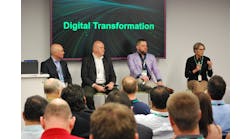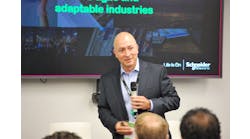It’s time to reimagine automation
Knowing I’d write about the future of process control and automation in this space, I pondered the usual suspects of metaphors and cliches that aim to explain different types of futures that conventional wisdom tends to dictate. There’s “The Twilight Zone,” of course. “Imagine, if you will…,” I said to myself in my best Rod Serling voice. I considered the plots of many sci-fi movies. I even sung—in my head—that 1980s Styx classic, “Mr. Roboto.” Heck, I created a virtual utopia of dystopian futures in my own imagination.
Then I remembered the theme of what I was about to write—reimagination. So, I reimagined what I imagined and came back down to earth. Turns out, the future of automation and process control isn’t so hard to summarize at all. Luckily, I found the perfect analogy among my notes from a recent trip to Foxboro, Mass., for Schneider Electric’s process control users’ forum.
The future of the business is best summed up by Michael Martinez, Foxboro DCS global leader at Schneider Electric, who recalled the evolution of technology that is used to listen to music. “Today, I can purchase just my favorite songs. I can hear my favorite song anytime I want and on any electronic device. We've decoupled music from physical media—recordings and the sound system—and now stream to the cloud and listen on any device such as a laptop or smartphone. Now, we can experience our music in entirely new ways,” he said, opening the forum.
Decoupling is a key performance indicator when we analyze the successful future of just about any technology. We’re well past the days of deciding whether a technology should operate in the cloud, should be untethered from cords and cables, or should no longer be confined to specific hardware. Process control and automation are no different, as Martinez pointed out.
Until recently, instrumentation manufacturers put hardware at the forefront of their innovations, forcing users to choose from one or a few technology vendors. But as Martinez said, that choice is “a little backward.” In fact, technology should be serving the process. “It should allow us to do the things that we need to do in our processes to achieve the outcomes that we're after for our customers, products and services,” Martinez added.
This type of reimagination has flipped the script, so to speak. Open systems are increasingly important to engineers because they design systems for users concerned about digital transformation and developing a smarter industry. Schneider Electric recently did a survey with its industrial customers and found that 80% consider interoperability an important capability. In today’s plant environments, the practice of everything being locked into one proprietary format is giving way to open systems.
Today’s supply chain challenges make correcting “vendor lock” even more vital. Instead, the goal is to enable collaboration, and that starts with thinking about the process first rather than prioritizing the hardware to run a system.
Going back to Martinez’s music analogy, it’s not about what technology or format you use to play your music anymore, it’s simply about playing your favorite songs whenever and wherever you want to listen to them.





